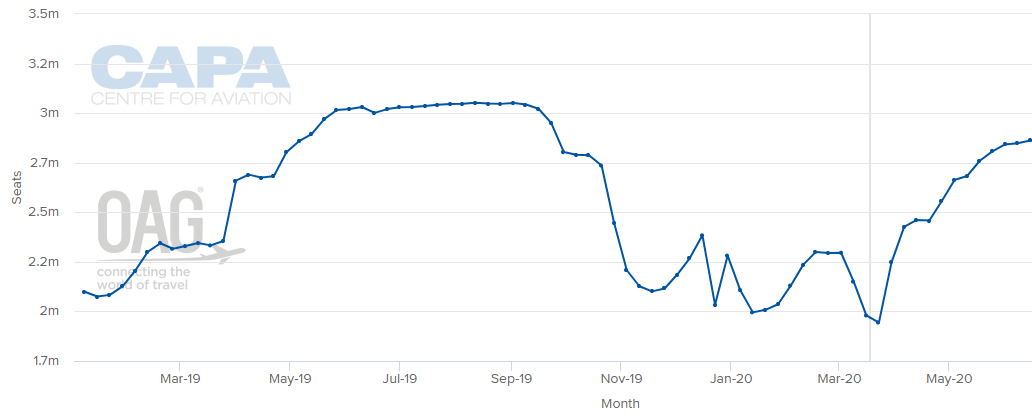It is not alone. Italy, Spain, France and Germany are also at a mature stage of COVID-19 infections, Scandinavia and Switzerland too, while Austria, Belgium and Netherlands are seeing the number cases rise over recent days. But, the United Kingdom is a good case study for highlighting how the world of travel is being impacted by this deadly virus and is need of life support as much as its many citizens currently infected.
We have heard warnings that more airlines could collapse. Respected aviation intelligence provider CAPA - Centre for Aviation has said that most of the world's airlines could face collapse in a couple of months due to cash flow issues. It says: "As the impact of the coronavirus and multiple government travel reactions sweep through our world, many airlines have probably already been driven into technical bankruptcy, or are at least substantially in breach of debt covenants".
The fact that Air Malta, Austrian Airlines and Brussels Airlines are among those to already or shortly temporary suspend operations highlights how big an issue the industry is facing. No airline wants its aircraft stuck on the ground, but right now it is more cost effective than flying them around empty as both the virus and travel restrictions eradicate demand.
CHART - The reduction in air capacity between the UK and the rest of Europe will become more clearly evident in the weeks ahead and as we emerge from the traditionally quieter seasonal travel period Source: CAPA - Centre for Aviation and OAG
Source: CAPA - Centre for Aviation and OAG
Major airports once hubs of travel activity have become expensive parking lots for aircraft. In fact, Karen Dee, chief executive officer of the UK's Airport Operators Association has highlighted that airports will "shut down in weeks" unless urgent action is taken to support the industry.
With travel bans proliferating and passengers being unwilling to fly, traffic through airports has plummeted. UK airports are already taking immediate and drastic action to cut costs and are scaling back investments in light of the situation. But, due to the fixed costs of operating airports, some support is required in the short-term.
"The UK's airports are critical national infrastructure, fulfilling a vital public service, and are on the frontline of the COVID-19 outbreak. It is essential that airport businesses remain operating and are able to weather this storm, so that they can provide the connectivity which drives growth, employment and prosperity after the crisis has abated," says Ms Dee.
Just as the United Kingdom has moved on from the 'containment' to 'delay' phase with the virus, we now need to be looking ahead to the future. As The Blue Swan Daily highlighted earlier this week in its data spotlight feature on China, the country where COVID-19 originated, is that the nation is showing some positive signs with limited spread and a return of capacity. Similarly, domestic quarantine measures put in place in Italy seem to have slowed the outbreak in northern regions of the country, where COVID-19 originated in the country.
It is unclear when, or indeed if, we will get back to the post-outbreak levels, but a vehicle to deliver that is required. Travel, and especially business travel, will play a very important role in any recovery. Clive Wratten, CEO of the Business Travel Association (BTA) in the UK says the business travel industry will play a "vital role in the UK's economic recovery" once the crisis ends.
"Business travellers are the people who forge the deals and build the relationships which make global trade possible," he explains. But to achieve this and for the industry to get to this point, he acknowledges that the industry "must first weather the current storm," and calls on the government to help save the industry from the prospect of collapse.
In letters to UK government ministers he has stressed the enormous impact of COVID-19 on business travel and the industry's long term importance to the UK economy. According to BTA, the UK business travel sector generates GBP10 billion in revenue every year and currently employs over 12,000 people located right across the UK.
Many of those employees would have already been required to take reductions in their pay, and without a package of support from the government, many more will lose their jobs as the COVID-19 crisis continues and businesses fail.
As we said earlier, this is not unique to the UK and is a global issue. Fortunately, many governments have already announced measures to support industry and the signs from the UK are looking positive, albeit more pressing social and educational measures are the priority.
In times of crisis most people pull together and collaboration within industry and with governments will be key during this current crisis. It is not time to dwell on the negatives, but to brace for what could be a considerable impact, and then be ready to return to normality… however that will look in the post-coronavirus world!
KEEP UP WITH THE LATEST NEWS…

The impact on airlines of the recent COVID-19 coronavirus outbreak, which began in China but has spread around the world, continues to have a devastating effect on the aviation and supporting industries. In a new essential daily update, CAPA - Centre for Aviation is curating intelligence from the World Health Organisation (WHO) and myriad industry sources available via its CAPA Membership news and data service. Its mission is to help cut through the noise and provide a useful daily snapshot of the COVID-19 outbreak evolution, together with key industry developments.